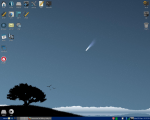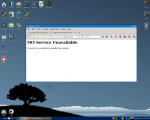Canonical is killing Unity 8, will ship GNOME as default
- Vous devez vous identifier ou créer un compte pour écrire des commentaires
This is not a joke
http://www.omgubuntu.co.uk/2017/04/ubuntu-18-04-ship-gnome-desktop-not-unity
Personally I think this is great, this will mean more work in making GNOME great, and unites the community.
I hope, this will also mean killing Snaps and just adoption of flatpak, Fedora and Arch already have them, so it will help to have software that most distributions can use, including of course FSF endorsed distributions :)
Sorry for the trump like comment, making GNOME great again :)
I am just happy for this change
I do not like GNOME, today is a tablet interface, which is fine for tablet computer. GNOME 2 or flashback version it is not so bad. I still prefer GNOME forks like MATE.
Your statement is not true. With just 1 extension, "Dash to dock", your problem is solved. There are plenty of extension to solve other "inconvenient issues", ;).
I agree, I don not like it too, latest versions depend hardly on Systemd, why a DE would depend on an init? because Systemd it is not really an init, it does things that are not related in what an init must do. This may be a different topic, but anyway, it is true.
oh, I <3 that meme, I even uploaded it to Diaspora* :D
https://diasp.org/posts/7026561
8 likes up to now :P
As far as know, GNOME Shell only depends on systemd-logind. logind replaced ConsoleKit (GNOME used to depend on it), which stopped being maintained four years ago: https://www.freedesktop.org/wiki/Software/ConsoleKit/
systemd is, indeed, not only an init system. It is an umbrella project that replaced many small and poorly integrated projects. With shared libraries, the code has become more robust too. In fact, logind even removed the necessity of "gnome-session" on GNU/Linux.
Well I really like GNOME :)
"Puppy looks like XP"
It's been a while since you say a computer running XP isn't it ;P
Wow, that's good news. Thank you for posting this here.
GNOME 3 is a fantastic DE, now. It's great that Canonical's going to stop fragmenting the community with Unity & Mir and put some money into a more universal project.
(That's also way more stylish!)
I'm afraid we ain't seen nothing yet. Shuttleworth, I bet, is going enterprise. He's not interested in the desktop anymore because there's no profit there and he's tired of losing money.
There's going to be a closed license Ubuntu Enterprise Edition.
The way I see it, enterprise editions are bad because they're proprietary-- but at least profits are funnelled into the development of libre software. If Canonical just kept developing convergence etc and died, that's one source of funding gone.
Besides, a lot of people and enterprises use Desktop-- it won't be a priority anymore, but development will certainly be active and there'll be less radical changes. Is that so bad?
I'm happy that they're ending Mir, but this sucks for the people that use Unity. Although maybe the community will take over.
Unity moves the menubar to the top bar/panel, MacOS style, when a window is maximized / full screened. Does GNOME 3 do that?
GNOME does not do that. Perhaps it would be possible to implement with an extension, but I'm not aware of any one like that.
However, GNOME does have a menu on the top bar, but that one typically has but a few options and must be specially supported by the application. It's mostly utilized by native GNOME applications, which, in turn, usually don't have a traditional menu bar. Other applications will only show the “quit” option there.
Yes :) Sadly it is also kind of heavy so Trisquel won't ship it :(
According to that article on OMGBuntu the Snaps project will continue for now. As Shuttleworth says in his blog, ultimately its the industry and the community who will decide, whether containered desktop apps are what we want, and if so, which format we want to use. Hopefully we will make that decisions at least partly on technical merit, and not just schoolyard politics ;P
Shuttleworth shows a lot of integrity in admitting that Ubuntu's push into the mobile device market has failed, like Mozilla's FirefoxOS before it. It's brave to face up to the fact that the software projects that were started to pursue that goal now fail a cost/ benefit analysis for his company, as he did with Ubuntu One, instead of continuing to throw money at those projects out of sheer bloody-mindedness.
I wouldn't write off Unity, Mir, Ubuntu Touch etc just yet though. I've met a few guys that have been working on them professionally for years, who really believe in them. They also disagree with Shuttleworth a lot, although they're smart enough to keep quiet about it at work. I can imagine some of them continuing or forking those projects, whether its under the umbrella of the Ubuntu Foundation, or some other incubator like the Apache Foundation or Software Conservancy or somesuch.
Android is a huge success... it overtook Windows NT in number of users in 2014, and now it has even overtaken Windows NT in number of world wide web page views even though Android devices lack proper keyboards and big screens.
This success was so much self-evident that six years ago everybody wanted to do things more Android-like. And of course, GNU/Linux developers thought they were the ones more ready to do it, because they already shared the Linux kernel. So there was this trend to design desktops for GNU/Linux as if they were for Android. GNOME 3 succumbed to it. Unity (Ubuntu's customized GNOME) went even further - here is the short review I wrote about it: http://www.grafotema.com/agullo/articulos/ubuntu/ubuntu.html#5
I remember being at an GNOME 3 presentation asking "So you cannot have two applications at the same time onscreen so you can copy things from one to another?". It was unbelivable to me. So we computer users with GNU/Linux had to withstand desktops that were obviously worse to use, because desktop developers happened to have the expectation that convergency with mobile devices would lead GNU/Linux to massive success.
Moves intended to multiply the user base at the cost of disappointing the old users show how little the developers cared for their users community. And guess what, sucess never came - I suppose new users never come when they see the old ones are unsatisfied. So, the move only succeded at betraying their old users' trust.
So I am happy to read that Unity is to disappear, and wish this lesson would be learnt once and for all.
GNOME Shell has always been able to "have two applications at the same time onscreen so you can copy things from one to another". In fact, you can have any window take the whole left or right half of the screen. With the mouse (drag the window to the desired side) or with a keyboard shortcuts. GNOME 2 could not do that. And maximizing windows by dragging to to the top is much easier than clicking on a small button in its corner. And, of course, there still is a keyboard shortcut for that.
I actually find GNOME far more efficient for those who use the keyboard (like me): you can type the Super key (the Windows key on most keyboards), the first letters of an application to switch to or to open and [Enter]. That is far more efficient than a window list and a menu. You can switch between applications (the classical Alt+Tab and Alt+Shift+Tab) but also between the windows of the current application (Alt+Key above Tab). And keyboard shortcuts are still there (e.g., to move between workspaces or to move windows across workspaces) and custom shortcuts can still be defined.
Finally, GNOME Shell has always had http://extensions.gnome.org for any customization. Extensions can turn GNOME Shell into a classical desktop, like Trisquel 7 does. GNOME 2's interface was not extensible.
I am proud to not have your Skype issues. Nobody should use Skype! Ever!
Axing Unity means devs must go.
Canonical, the maker of Linux distro Ubuntu, is axing staff and closing projects under a sudden commercial get-fit regime. [...] The cuts came after Canonical founder and millionaire Mark Shuttleworth's decision to seek potential outside investors. These investors determined that Canonical was overstaffed and some projects lacked focus.
https://www.theregister.co.uk/2017/04/06/canonical_cuts_jobs_with_unity_bullet/
$ sed -e 's|the maker of Linux distro Ubuntu|the maker of GNU/Linux distro Ubuntu|'
Better :)
Canonical's restructuring moves ahead. Shuttleworth back as CEO, Canonical seeks going public.
Canonical says it is still committed to the desktop, but the company's financial success is coming from cloud computing, servers, and Internet of Things workloads.
The company "axed more than half the team who worked on Unity," reassigning some employees to other parts of the company and laying off others, The Register reported last week. Shuttleworth spoke to The Register about his plans for Canonical, saying the company might eventually go public.
- Vous devez vous identifier ou créer un compte pour écrire des commentaires











